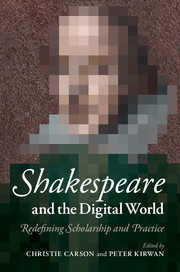Book contents
- Frontmatter
- Contents
- Notes on contributors
- Acknowledgements
- Shakespeare and the digital world
- Part I Defining current digital scholarship and practice
- Part II Defining current digital scholarship and practice
- Half-time: A pause for reflection
- Part III Redefining the boundaries and practices of Shakespeare studies online
- 10 Unlocking scholarship in Shakespeare studies
- 11 Living with digital incunables, or a ‘good-enough’ Shakespeare text
- 12 Shakespeare in virtual communities
- 13 Gamekeeper or poacher?
- Part IV Redefining the boundaries and practices of Shakespeare studies online
- Index
- References
12 - Shakespeare in virtual communities
Published online by Cambridge University Press: 05 July 2014
- Frontmatter
- Contents
- Notes on contributors
- Acknowledgements
- Shakespeare and the digital world
- Part I Defining current digital scholarship and practice
- Part II Defining current digital scholarship and practice
- Half-time: A pause for reflection
- Part III Redefining the boundaries and practices of Shakespeare studies online
- 10 Unlocking scholarship in Shakespeare studies
- 11 Living with digital incunables, or a ‘good-enough’ Shakespeare text
- 12 Shakespeare in virtual communities
- 13 Gamekeeper or poacher?
- Part IV Redefining the boundaries and practices of Shakespeare studies online
- Index
- References
Summary
Entering anecdotage
It was not only in the hey-days of new historicism that the opening anecdote seemed desirable. In 2002 Christopher Hoadley and Roy D. Pea started an article with an anecdote as they began their exploration of support tools for what they saw or foresaw as the ways to create ‘a knowledge-building community’, the kind of abstracted phrase that is necessary for considering the sociology of such organisational matrices but which still makes my blood run cold. The anecdote, told at inordinate length, was chosen to illustrate the obvious truth that ‘[f]inding a professional connection with a colleague seems like a simple task but can devour hours of time’ (2002: 321). ‘David’, the name they give to the subject of their story, is in search of someone to work with on ‘interactive toys’. Keen to find a woman located in western Canada who had won an award for women in computer science and whose work he vaguely remembered having heard of, he searched on the web for her. Initially the search is unsuccessful: ‘[a]fter spending nearly half an hour, he decided to try a different strategy’ (321) and I hear the sound of horror lurking behind this appalling expenditure of time on a fruitless search. Now, using his social networks (by which the authors cannot yet mean Facebook), David finds that a colleague remembers the woman’s work being cited in a book by someone they name ‘Renee’ who was based in Los Angeles. Library catalogue and web searches for the book and its author waste a further ‘Ten to 20 minutes’, especially when he cannot locate Renee’s home page on the website of her university. Finally giving up on Renee, David searches the computer science departments of western Canadian universities and eventually locates his mysterious potential collaborator, though the ‘search odyssey lasted hours’ (2002: 322).
- Type
- Chapter
- Information
- Shakespeare and the Digital WorldRedefining Scholarship and Practice, pp. 160 - 175Publisher: Cambridge University PressPrint publication year: 2014
References
- 1
- Cited by



